[2007] 1 SLR(R) 629 - Singapore Law
[2007] 1 SLR(R) 629 - Singapore Law
[2007] 1 SLR(R) 629 - Singapore Law
You also want an ePaper? Increase the reach of your titles
YUMPU automatically turns print PDFs into web optimized ePapers that Google loves.
666 SINGAPORE LAW REPORTS (REISSUE) [<strong>2007</strong>] 1 <strong>SLR</strong>(R)<br />
(b) a similar contract but where one party is a national of a foreign<br />
state: the arbitration agreement ceases to be domestic, but the cause of<br />
action is still “potentially justiciable” by the English court, and will be<br />
adjudicated upon if there is no stay; and<br />
(c) a contract with an arbitration agreement calling for arbitration<br />
abroad.<br />
78 With respect to the first two illustrations, Lord Mustill said that the<br />
The Siskina restrictions on the grant of an interlocutory injunction did not<br />
apply. In the case of the third illustration, his Lordship (after stating that an<br />
arbitration agreement providing for arbitration in London justified the<br />
inference of English law as the substantive proper law of the contract, and<br />
hence giving the court jurisdiction over the cause of action), said (at 363):<br />
If the seat of arbitration is abroad this source of jurisdiction is cut off,<br />
and the inhibitions created by the Siskina authorities will preclude the<br />
grant of an injunction. Nevertheless, if the facts are such that the court<br />
has jurisdiction in some way other than the one just described I can see<br />
no reason why the additional foreign element should make any<br />
difference to the residual jurisdiction of the court over the dispute, and<br />
hence to the existence of the power to grant an injunction in support.<br />
So also in the present case. [emphasis added]<br />
79 After Channel Tunnel and until the enactment of the UK Arbitration<br />
Act 1996, the position in England was that the court had power to grant<br />
Mareva injunctions in aid of foreign court or arbitral proceedings if the<br />
substantive claim was justiciable in an English court. Channel Tunnel<br />
clarified and circumscribed the doctrine in The Siskina to the extent stated,<br />
but the prerequisite that the court must have jurisdiction over the cause of<br />
action, even if on a residual basis, remained intact.<br />
80 It seems clear to us that the House of Lords in Channel Tunnel was<br />
strongly influenced not only by their own worldview of the role of the<br />
English courts in international dispute resolution, but also by the judicial<br />
philosophy that curial assistance should be given to foreign court or arbitral<br />
proceedings to ensure that justice was done. In Channel Tunnel, Lord Goff<br />
of Chieveley said (at 341):<br />
I add a few words of my own on the submission that the decision of<br />
this House in [The Siskina] would preclude the grant of any injunction<br />
under section 37(1) of the Supreme Court Act 1981, even if such<br />
injunction were otherwise appropriate. If correct, this submission<br />
would have the effect of severely curtailing the powers of the English<br />
courts to act in aid, not only of foreign arbitrations, but also of foreign<br />
courts. Given the international character of much contemporary<br />
litigation and the need to promote mutual assistance between the<br />
courts of the various jurisdictions which such litigation straddles, it<br />
would be a serious matter if the English courts were unable to grant<br />
interlocutory relief in cases where the substantive trial and the ultimate


![[2007] 1 SLR(R) 629 - Singapore Law](https://img.yumpu.com/7082457/38/500x640/2007-1-slrr-629-singapore-law.jpg)
![[2011] 1 SLR 727 - Singapore Law](https://img.yumpu.com/51140774/1/166x260/2011-1-slr-727-singapore-law.jpg?quality=85)
![[1983-1984] SLR(R) 447 - Artic Builders & Co - Singapore Law](https://img.yumpu.com/50909204/1/164x260/1983-1984-slrr-447-artic-builders-co-singapore-law.jpg?quality=85)
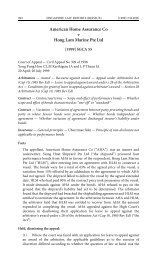
![[1996] 2 SLR(R) 292 - Lim Eng Hock Peter v ... - Singapore Law](https://img.yumpu.com/47482222/1/164x260/1996-2-slrr-292-lim-eng-hock-peter-v-singapore-law.jpg?quality=85)
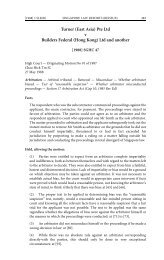
![[2006] 1 SLR(R) 197 - PT Asuransi Jasa Indonesia - Singapore Law](https://img.yumpu.com/46425352/1/164x260/2006-1-slrr-197-pt-asuransi-jasa-indonesia-singapore-law.jpg?quality=85)
![[1985-1986] SLR(R) 503 - Woh Hup (Pte) - Singapore Law](https://img.yumpu.com/45676364/1/164x260/1985-1986-slrr-503-woh-hup-pte-singapore-law.jpg?quality=85)
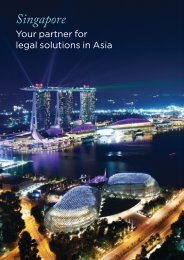
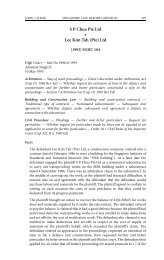
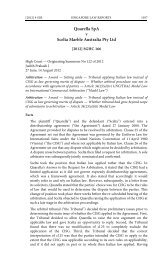
![[2010] 2 SLR 821 - Singapore Law](https://img.yumpu.com/43145563/1/166x260/2010-2-slr-821-singapore-law.jpg?quality=85)
![[2007] 1 SLR(R) 597 - PT Asuransi Jasa Indonesia - Singapore Law](https://img.yumpu.com/42983489/1/164x260/2007-1-slrr-597-pt-asuransi-jasa-indonesia-singapore-law.jpg?quality=85)
![[1989] 1 SLR(R) 433 - Singapore Law](https://img.yumpu.com/42649524/1/164x260/1989-1-slrr-433-singapore-law.jpg?quality=85)
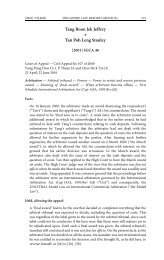
![[1997] 3 SLR(R) 360 - Singapore Law](https://img.yumpu.com/42287507/1/164x260/1997-3-slrr-360-singapore-law.jpg?quality=85)